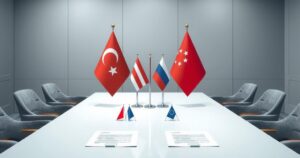Understanding the Nigeria-South Africa Rivalry: Historical Grievances and Contemporary Conflicts

The competition between Nigeria and South Africa has intensified, marked by sports frictions and historical tensions dating back to the post-apartheid era. Recent events, including travel permit denials for a Nigerian youth basketball team and cultural disputes, highlight ongoing animosities exacerbated by xenophobia and political competition. Although economic relations remain robust, experts argue that collaboration is essential for both nations to overcome their rivalry.
The rivalry between Nigeria and South Africa, two prominent African nations, has escalated into various domains including sports and cultural exchanges, with implications that threaten regional unity. This conflict experienced a recent manifestation during a diplomatic crisis concerning Nigeria’s youth basketball team’s participation in a prestigious international tournament in South Africa. Nigerian officials asserted that the South African authorities had sought to obstruct the team’s involvement, showcasing the existing tensions that have plagued relations for decades. The historical roots of this discord can be traced back to the post-apartheid era, particularly since 1994 when Nigeria, under military rule, faced condemnation from South Africa’s President Nelson Mandela for the execution of activist Ken Saro-Wiwa. This condemnation led to Nigeria’s withdrawal from the 1996 African Cup of Nations hosted in South Africa, establishing a precedent for retaliatory actions that continues into modern times. As historical tensions simmered, a surge of xenophobic violence against Nigerians in South Africa in 2019 worsened bilateral relations, prompting the Nigerian government to repatriate citizens. Despite attempts to mend ties through cooperation agreements during official visits, recent incidents such as travel permit complications for the Nigerian youth team indicate underlying conflicts remain unresolved. Notably, the rivalry extends beyond sports; it has affected social interactions including ride-sharing services, cultural competitions, and music collaborations. Prominent instances include the withdrawal of Miss South Africa contestant Chidimma Adetshina due to xenophobic harassment linked to her Nigerian heritage and public disputes over the authenticity and recognition of musical genres, particularly between Nigeria’s Afrobeats and South Africa’s Amapiano. Cultural analysts highlight that the ongoing animosity is not merely a matter of competition but a reflection of broader political undercurrents affecting both nations’ international standing. Concerns have been raised regarding South Africa’s purported efforts to marginalize Nigeria within international platforms like BRICS to enhance its geopolitical influence. Despite these frictions, economic interconnections persist, with South Africa remaining a significant trade partner for Nigeria. Experts suggest that overcoming these rivalries would allow both nations to focus on mutual interests that could benefit the African continent as a whole.
The historical context surrounding the rivalry between Nigeria and South Africa reveals deep-seated grievances stemming from past political dynamics and the lingering effects of apartheid. Following Nigeria’s military rule during South Africa’s transition to democracy, tensions escalated as political leaders openly criticized one another. The issues of xenophobia, economic competition, and cultural disputes have compounded these rivalries, manifesting in various sectors including sports and entertainment. Recent events illustrate how the rivalry has evolved from ideological differences to encompass economic and cultural dimensions, affecting inter-country relations.
In conclusion, the Nigeria-South Africa rivalry presents a multifaceted challenge to the diplomatic landscape of Africa. It is evident that historical grievances and contemporary incidents have fueled tensions, impacting various sectors including sports and culture. Though economic ties still exist, addressing the root causes of this rivalry is essential for fostering collaboration and unity across the continent. Both nations have the potential to benefit greatly from reinforcing common interests rather than allowing past disputes to dictate future relations.
Original Source: arynews.tv






